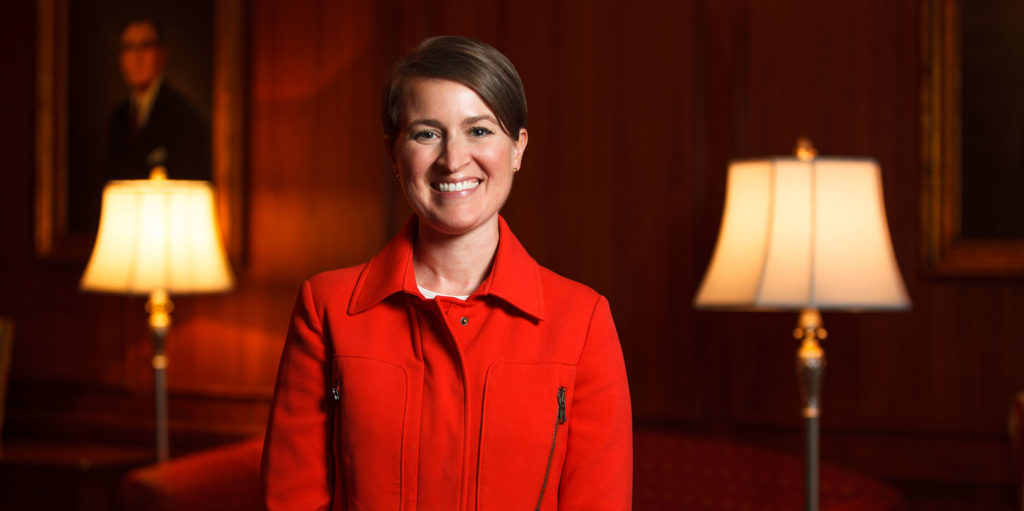Elizabeth Burch, the Charles H. Kirbo Chair of Law in the School of Law, uses current events and her scholarly interests in mass torts and complex litigation to spark classroom discussion.
Where did you earn degrees and what are your current responsibilities at UGA?
I earned my bachelor’s degree in English with a minor in political science from Vanderbilt University and my Juris Doctor from the Florida State University College of Law. I’m currently the Charles H. Kirbo Chair of Law in the law school, where I teach civil procedure, complex litigation and mass torts and write about class actions and multidistrict litigation (suits like those over the Volkswagen emissions, GM’s ignition switch defects and the BP oil spill).
When did you come to UGA and what brought you here?
I practiced law in Atlanta and taught at both Cumberland Law School and Florida State College of Law before moving to UGA, but I grew up (mostly) in Marietta, Georgia. So when I received the call from UGA, it was a natural fit both professionally and personally. My colleagues here have created a wonderful community of teachers, scholars and friends.
What are your favorite courses and why?
I couldn’t pick a favorite; I enjoy them all for different reasons. “Civil Procedure” is a first-year course for law students and it’s about learning an insider’s language. It’s different than other first-year classes—if you’ve had a sibling, you know a bit about torts and battery; if you’ve signed a lease, you know about contracts and property; but civil procedure is completely foreign. So, I enjoy seeing the light bulbs go on in that class. Mass torts and complex litigation are areas in which I write, so I enjoy using current events to teach students about the strategy and challenges that confront the litigants and the judicial system when handling mass disputes.
What interests you about your field?
The way the judicial system handles cases with thousands of litigants constantly evolves, and those cases involve high-stakes, bet-the-company litigation that attract some of the nation’s best attorneys. So it’s an ever-changing, dynamic field.
What are some highlights of your career at UGA?
I love receiving emails from former students, particularly when they realize that civil procedure really does make the world go around. I was also incredibly honored that then-Dean Rebecca White nominated me for the American Law Institute’s Young Scholars Medal and that our current dean, Bo Rutledge, attended the awards ceremony when I received the medal in 2015.
How does your research or scholarship inspire your teaching, and vice versa?
My research and teaching are heavily integrated, so it’s easy to use current events and my scholarly interests to spark classroom discussion. And that discussion in turn helps me to think through and clarify my scholarship.
What do you hope students gain from their classroom experience with you?
Obviously, I want them to understand the material, but our classes are about so much more than just doctrine. They’re about giving students the tools and skills they’ll need to tackle the new issues they’ll face in practice and having the moral fabric to do what’s right even when that conflicts with their own self interest.
Describe your ideal student.
One with a good sense of humor and a strong work ethic.
Favorite place to be/thing to do on campus is…
Is it warm or cold outside? When it’s sunny and warm, walking around North Campus is hard to beat, but if it’s cold and rainy my office is a pretty comfortable place.
Beyond the UGA campus, I like to…
Go for a run and frequent Independent Bakery. Why run if you can’t have a cinnamon bun afterward?
Favorite book/movie (and why)?
Anything by Tony Early, who teaches creative writing at Vanderbilt and was my favorite professor. I don’t have as much time as I’d like for movies, but “Arrested Development” and “The Wire” are my all-time favorite TV shows.
Proudest moment at UGA?
Every year at graduation. I’m so proud of our students. I know how much time and effort they put into their studies. And I look forward to seeing what all they’ll accomplish in the future.
(Originally published March 27, 2016)
